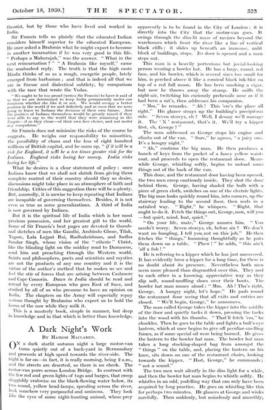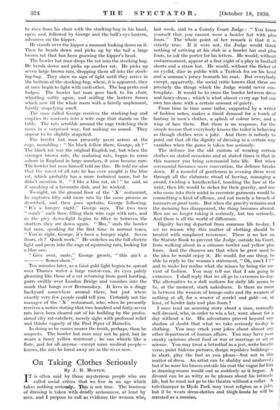A Dark Night's Work
By HAMISH MACLAREN.
oN a dark starlit autumn night a large motor-van
turns quietly out of a back-yard in Bermondsey and proceeds at high speed towards the river-side. The night is far on—in fact, it is really morning, being 2 a.m., and the streets are deserted, so there is no check. The motor-van purrs across London Bridge. In contrast with the few red and green lights of tugs and barges, that creep sluggishly crabwise on the black-flowing water below, its two round, yellow head-lamps, speeding across the river, look somehow very purposeful and ominous. They look like the eyes of some night-hunting animal, whose prey
apparently is to be found in the City of London : it is directly into the City that the motor-van goes. It swings through the dim-lit maze of ravines beyond the warehouses which front the river like a line of vertical black cliffs ; it slides up beneath an immense, unlit block of buildings, stops. Its door is opened and a man steps out.
This man is a heavily portentous but jovial-looking person wearing a bowler hat. He has a large, round, red face, and his bowler, which is several sizes too small for him, is perched above it like a comical black ink-blot on top of a red full moon. He has been smoking a cigar, but now lie throws away the stump. He sniffs the night-air, twitching his curiously prehensile nose as if it had been a rat's, then addresses his companion.
" Mm," he remarks. " Ale ! This 'ere's the place all right." His glance strays up the building's precipitous side. " Seven storeys, eh ? Well, I dessay we'll manage it. The X ' restaurant, that's it. We'll try a kipper first, eh, George ? "
The man addressed as George stops his engine and climbs out of the van. "Sure," he agrees, "a juicy one. It's a hungry night."
" Ah," confirms the big man. He then produces a bunch of keys from the pocket of a fancy yellow waist- coat, and proceeds to open the restaurant door. Mean- while George, whistling softly, begins to unload sonic things out of the back of the van.
This done, and the restaurant door having been opened, the two men creep cautiously inside. They shut the door behind them. George, having shaded the bulb with a piece of green cloth, switches on one of the electric lights. The big man looks quickly round him, into corners, up the stairway leading to the second floor, then nods in a satisfied way. " Right," he whispers. " Right, that ought to do it. Fetch the things out, George, now, will you —but quiet, mind, hsst, quiet."
" On your life, mate," George assures him. " You needn't worry. Seven storeys, eh, before six ? We don't want no bungling, I tell you, not on this job." lie then fetches the " things," humming thoughtfully as he puts them down on a table. " Phew ! " he adds, " this ain't 'alf a fish ! "
He is referring to a kipper which he has just uncovered. It has evidently been a kipper for a long time, for there is no doubt about its presence. Nevertheless both men seem more pleased than disgruntled over this. They nod to each other in a knowing, appreciative way as they slip soft, sound-muffling shoes over their boots. The bowler hat man muses aloud : " Mm. Ah ! Tha's right, George. A hungry night, let's hope." He pads round the restaurant floor seeing that all exits and entries arc closed. " We'll begin, George," he announces.
The man called George takes the kipper into the middle of the floor and quietly tacks it down, pressing the tacks into the wood with his thumbs. " That'll fetch 'ens," he chuckles. Then he goes to the table and lights a bull's-eye lantern, which at once begins to give off peculiar-smelling fuines, as if some special oil were being burned. He gives the lantern to the bowler hat man. The bowler hat man takes a long stocking-shaped bag from amongst the " things " on the table, and, placing the lantern on his knee, sits down on one of the restaurant chairs, looking towards the kipper. " Hsst, George," he commands ; " not a sound."
The two men wait silently in the dim light for a while, and then the bowler hat man begins to whistle softly. He whistles in an odd, yodelling way that can only have been acquired by long practice. He goes on whistling like this for perhaps two minutes. Ile glances at George and winks carefully. Them suddenly, but noiselessly and smoothly, he rises from his chair with the stocking-bag in his hand, open, and, followed by George and the bull's-eye lantern, advances on the kipper.
He stands over the kipper a moment looking down on it. Then he bends down and picks up by the tail a large brown rat that has been gnawing the kipper's head.
The bowler hat man drops the rat into the stocking bag. He bends down and picks up another rat. He picks up seven large brown rats, dropping them all into the stock- ing-bag. They show no sign of fight until they arrive in the bottom of the stocking-bag, where, it is apparent, they at once begin to fight with each other. The bag perks and bulges. The bowler hat man goes back to his chair, whistling softly again, and sniffing the lantern fumes which now fill the whole room with a faintly unpleasant, faintly stupefying smell.
The man called George receives the stocking-bag and empties its contents into a wire cage that stands on the table. The rats scrabble around the cage twitching their noses in a surprised way, but making no sound. They appear to be slightly stupefied.
The bowler hat man presently peers across at the cage, mumbling : " No black fellow there, George, ah ? " The black rat was the original English rat, but when the stronger brown rats, the seafaring rats, began to come ashore in England in large numbers, it soon became rare. The bowler hat man himself told me this. He told me also that the rarest of all rats he has ever caught is the blue rat, which probably has a more technical name, but he didn't mention it. " I like a blue rat, ah I " he said, as if speaking of a favourite dish, and he winked.
To-night, on the ground floor of the ' X ' restaurant, he captures fifty odd more rats by the same process as described, and then goes upstairs, George following. " It's a hungry night," George says, The two men " comb " each floor, filling their wire cage with rats, and as the grey dawn-light begins to filter in between the shutters they are down again. " Mm," nods the bowler hat man, speaking for the first time in normal tones, " You're right, George, it's been a hungry night. Seven floors, eh ? Quick work." He switches on the full electric light and peers into the cage of squirming rats, looking for a blue one.
" Give over, mate," George growls, " this ain't a flower-show."
Ten minutes later, as a faint gold light begins to spread over Thames water a large motor-van, its eyes palely gleaming like those of a cat returning from good hunting, purrs swiftly over London Bridge and vanishes into the murk that hangs over Bermondsey. It lives in a dingy backyard somewhere around there, but just where exactly very few people could tell you. Certainly not the manager of the ' X ' restaurant, who, when he presently receives a notice stating that two hundred and forty-seven rats have been cleared out of his building by the profes- sional city rat-catchers, merely sighs with profound relief and thinks vaguely of the Pied Piper of Hamelin.
In doing so he comes nearer the truth, perhaps, than he suspects. The bowler hat man may not be pied, but he wears a fancy yellow waistcoat ; he can whistle like a flute, and for all anyone—except some medical people— knows, the rats he lured away are in the river now.

























































 Previous page
Previous page